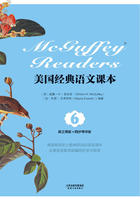
LESSON 15
A POLITICAL PAUSE
Charles James Fox, 1749-1806, a famous English orator and statesman, was the son of Hon. Henry Fox, afterward Lord Holland; he was also a lineal descendant of Charles II. of England and of Henry IV, of France. He received his education at Westminster, Eton, and Oxford, but left the University without graduating. He was first elected to Parliament before he was twenty years old. During the American Revolution, he favored the colonies; later, he was a friend and fellow-partisan both with Burke and Wilberforce. Burke said of him, “He is the most brilliant and successful debater the world ever saw.” In his later years, Mr. Fox was as remarkable for carelessness in dress and personal appearance, as he had been for the opposite in his youth. He possessed many pleasing traits of character, but his morals were not commendable; he was a gambler and a spendthrift. Yet he exercised a powerful influence on the politics of his times. This extract is from a speech delivered during a truce in the long war between England and France.
“But we must pause, ” says the honorable gentleman. What! must the bowels of Great Britain be torn out, her best blood spilt, her treasures wasted, that you may make an experiment? Put yourselves—Oh! that you would put yourselves on the field of battle, and learn to judge of the sort of horrors you excite. In former wars, a man might at least have some feeling, some interest, that served to balance in his mind the impressions which a scene of carnage and death must inflict.
But if a man were present now at the field of slaughter, and were to inquire for what they were fighting— “Fighting! ”, would be the answer; “they are not fighting;they are pausing.” “Why is that man expiring? Why is that other writhing with agony? What means this implacable fury? ” The answer must be, “You are quite wrong, sir, you deceive yourself, —they are not fighting, —do not disturb them, —they are merely pausing! This man is not expiring with agony, —that man is not dead,—he is only pausing! Bless you, sir, they are not angry with one another; they have now no cause of quarrel; but their country thinks that there should be a pause. All that you see is nothing like fighting, —there is no harm, nor cruelty, nor bloodshed in it; it is nothing more than a political pause. It is merely to try an experiment—to see whether Bonaparte will not behave himself better than heretofore; and, in the meantime, we have agreed to a pause, in pure friendship! ”
And is this the way that you are to show yourselves the advocates of order? You take up a system calculated to uncivilize the world, to destroy order, to trample on religion, to stifle in the heart not merely the generosity of noble sentiment, but the affections of social nature; and in the prosecution of this system, you spread terror and devastation all around you.
 STUDY NOTE
STUDY NOTE
The Hundred Years War (1337-1453) was actually a series of wars between England and France with some pauses. Most historians break this conflict into four distinct wars (1337-1360), (1369-1373), (1412-1420), and (1423-1453).
 STUDY GUIDE
STUDY GUIDE
A. Vocabulary Power—Read the following definitions and answer the questions which contain vocabulary words from the story.
1. Pause—to stop for a short time. In war, how long can a pause be?
2. Carnage the killing of many people. Why is there so much carnage in war?
3. expiring—dying. When people expire in war, is it a waste? Why or why not?
4. agony—extreme, terrible pain. Tell about a time when you were in agony.
5. quarrel—argue. Do you ever quarrel with your friends? What do you quarrel about?
6. trample—to walk on and crush. Would you be angry if someone trampled an expensive thing of yours? Why?
7. terror—extreme fear. When have you felt terror?
8. devastation—causing great destruction. Do you know a country that has suffered devastation?
B. Opinion Questions—Answer and give reasons for these questions.
1. This speech was given during a truce. This is a period of peace. Why were people still dying?
2. Talking about the war, it says “... their country thinks there should be a pause”. What does this mean?
3. Is there ever a good reason for war? Why or why not?
4. England and France fought off and on for over one hundred years. Why do you think they fought for so long?
5. Why is this reading called “A Political Pause”?
C. Opposites—Find words in the reading which are opposite to the words in this exercise.
1. pleasure: a ____
2. happy: a ____
3. agree: qu ______
4. rebuild: d ______
5. free: s _____
6. absent: p ______